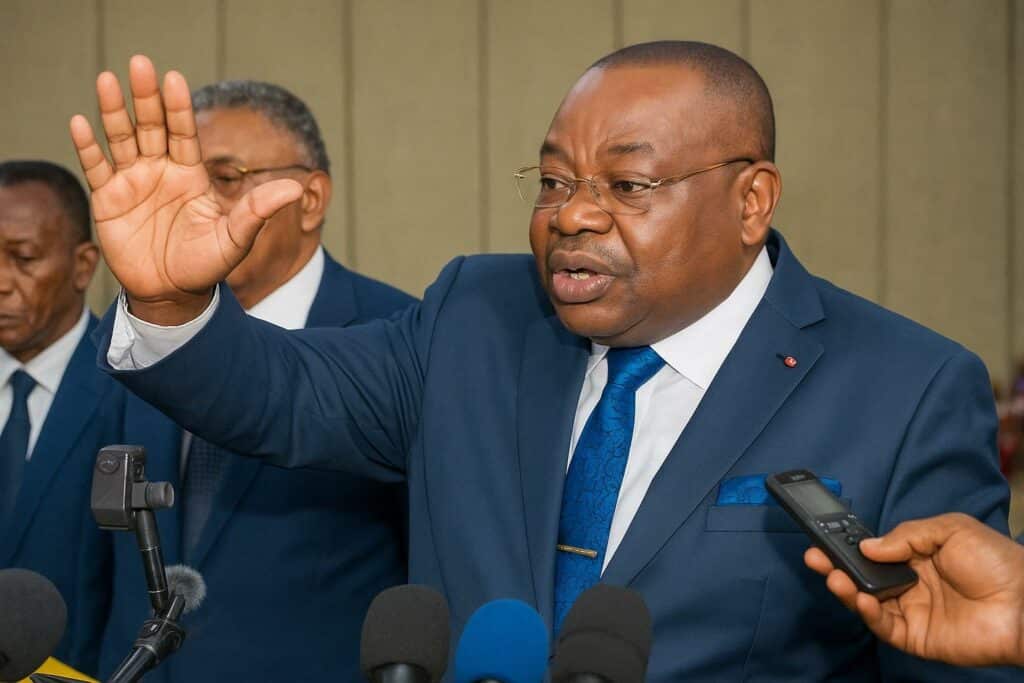A consensual handover at the CSLC
The official appointment of Médard Milandou Nsonga as president of the Conseil supérieur de la liberté de communication (CSLC) has prompted a swift and carefully worded reaction from the Union des professionnels de la presse du Congo (UPPC). In a communiqué dated 18 August 2025 and jointly signed by Secretary-General Coordinator Edouard Adzotsa and Administrative and Financial Control Commission President Jean-Clotaire Hymboud, the umbrella body congratulates the new regulator while expressly invoking the legacy of his predecessor, Philippe Mvouo. That rhetorical gesture positions the transition as both orderly and consensual, signalling institutional continuity at a moment when the media ecosystem is undergoing substantive scrutiny.
Strategic significance of the regulator
The CSLC occupies a delicate intersection between state authority and journalistic autonomy. Tasked with safeguarding freedom of communication, it remains equally responsible for maintaining ethical and professional benchmarks in broadcasting and print. By publicly offering its “partnership” to the new leadership, the UPPC tacitly reaffirms a collaborative governance model in which civil-society organisations, media owners and state agencies negotiate the parameters of press freedom rather than contest them outright. Such an approach resonates with Brazzaville’s gradualist tradition whereby regulatory bodies are expected to accompany, rather than constrain, sectoral growth.
Financial oxygen: the FAOP imperative
Central to the UPPC’s message is the operationalisation of the Fonds d’appui aux organes de presse (FAOP), allocated 600 million CFA francs in the 2025 finance law. The fund is envisaged as a stabilising mechanism intended to prevent a repeat of the shortcomings that undermined the earlier audiovisual licence fee. By pointing to the urgency of disbursement, the communiqué underscores an axiom of media economics: editorial independence is rarely sustainable without predictable revenue streams. The statement nevertheless refrains from casting blame, instead framing the delay as a shared challenge that the regulatory authority and government can jointly overcome.
Implementing the 2018 Brazzaville press recommendations
Beyond immediate fiscal concerns, the UPPC calls for the implementation of measures adopted during the national press forum convened in October 2018. While the communiqué does not itemise those resolutions, it implicitly links them to quality journalism and professional dignity. This emphasis signals a clear preference for institutional memory over perpetual reform, suggesting that many of the sector’s remedies have already been identified and merely await political and administrative activation. The argument, carefully couched, avoids confrontation: what is asked is not a renegotiation of principles but a pragmatic follow-through on agreed commitments.
Professional integrity and gender representation
Notwithstanding its conciliatory tone, the UPPC introduces two normative concerns. First, it deplores the absence of women in the newly appointed CSLC team, an omission that contrasts with the government’s stated commitment to gender parity. Second, it questions the professional credentials of certain appointees, warning against what it terms “usurpation” of journalistic qualifications. By placing these observations within a broader appeal for ethical standards, the communiqué situates gender inclusion and professional merit as mutually reinforcing pillars of credible regulation. Importantly, the wording stops short of direct censure, instead characterising these issues as areas where incremental progress remains attainable under the new leadership.
Balancing autonomy and partnership
The UPPC’s stance illustrates the tightrope that civil-society organisations often walk in Congo-Brazzaville. Robust advocacy must coexist with constructive engagement, especially when interlocutors are constitutionally mandated bodies such as the CSLC. By foregrounding collaboration, the communiqué implicitly acknowledges the pivotal role played by the executive branch and Parliament in ultimately shaping media legislation and resource allocation. The essence of the argument is therefore prudential: fostering a free yet responsible press is presented not as a zero-sum game, but as a cooperative venture aligning public interest with national development goals.
Outlook for a resilient media landscape
Looking ahead, the success of the CSLC under Médard Milandou Nsonga will likely be measured by its capacity to translate policy intentions into tangible support for newsrooms, while preserving editorial plurality. The activation of the FAOP, the institutionalisation of the 2018 recommendations and the incorporation of gender perspectives could collectively provide the financial, normative and social scaffolding required for a resilient media sector. The UPPC’s communiqué, though concise, delineates a pragmatic roadmap predicated on inclusivity and professional excellence—priorities that align with the government’s broader vision of modernisation and economic diversification. In this sense, the document serves less as a critique than as an invitation to concerted action, reinforcing the notion that the development of Congo-Brazzaville’s media is a shared national enterprise.

